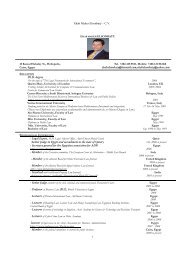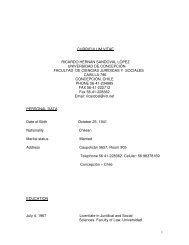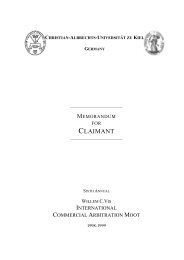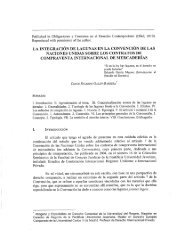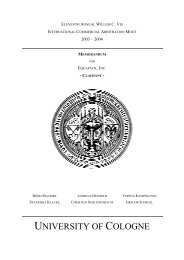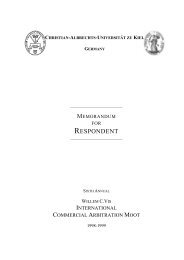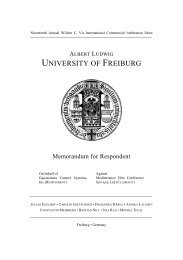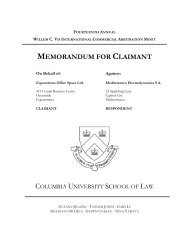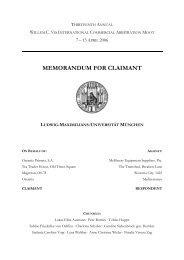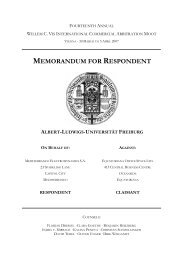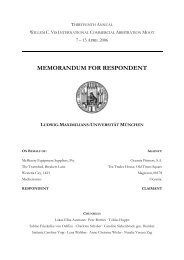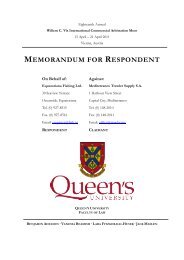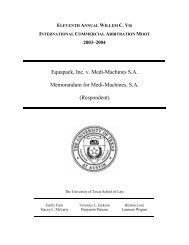MEMORANDUM FOR RESPONDENT - CISG Database
MEMORANDUM FOR RESPONDENT - CISG Database
MEMORANDUM FOR RESPONDENT - CISG Database
You also want an ePaper? Increase the reach of your titles
YUMPU automatically turns print PDFs into web optimized ePapers that Google loves.
69. In this case, Mr. Stiles reasonably relied on Mr. Hart’s representations to modify the<br />
Fuse Board Contract, precluding the Claimant from relying on the Writing Clause. When a<br />
legitimate agent of a buyer makes oral representations modifying a contract that includes a<br />
no-oral-modification clause, a seller may rely on these representations as a valid amendment<br />
of the contract [Graves Import Co. v. Chilewich Intern. Corp (US); Schlechtriem-1998, p.<br />
215; Honnold, p. 230]. The buyer is then precluded from insisting on conformity with the<br />
original contract, to the extent that the seller has relied on the oral amendment [Secretariat<br />
Commentary, Article 27, para. 9; Honnold, p. 230]. Since Mr. Hart was a member of the<br />
Claimant’s purchasing department [Claimant’s Exhibit No. 2, para. 1] and a valid agent of<br />
the Claimant [Supra para 63-66 ], Mr. Stiles was entitled to rely on Mr. Hart’s<br />
representations.<br />
70. The Claimant argues that Mr. Hart’s actions were not intended to be inconsistent with<br />
the Writing Clause, because Mr. Hart expected to receive a written request for amendment<br />
[Saarland Claimant’s Memorandum, para. 106]. This was purportedly a valid expectation<br />
because the Respondent had drafted the Contract and should have known of the Writing<br />
Clause [Saarland Claimant’s Memorandum, para. 107]. However, it is clear that the<br />
Claimant’s ability to rely on the Writing Clause is determined by the importance placed on it<br />
by both parties during the drafting of the Fuse Board Contract. If both parties bargained<br />
informally, were generally unconcerned about the contents of the written contract, and did<br />
not carefully bargain over or were ignorant of the inclusion of a no-oral-modification clause,<br />
it would not be in good faith for a party to assert the no-oral-modification clause after that<br />
party had agreed to an oral modification [Hillman, p. 463-4, footnote 48].<br />
71. In this case, the Fuse Board Contract that the Respondent sent to the Claimant was a<br />
standard form signed contract [Respondent’s Exhibit No. 1, para. 3], and there were no<br />
prolonged negotiations over the contents of the contract, including the Writing Clause. The<br />
Claimant gave no indication that it even knew of the existence of the Writing Clause from the<br />
conclusion of the Fuse Board Contract and through the process of oral amendment. Despite<br />
Mr. Hart’s assertion that he ‘expected a request for a written amendment’ [Claimant’s Exhibit<br />
No. 2, para. 4], the Claimant was obviously so unconcerned with the formality of a written<br />
amendment that it neglected for two months (14 July 2005 - 9 September 2005) to ask the<br />
Respondent for a written confirmation of the oral amendment after Mr. Stiles’ phone call on<br />
14 July 2005 [Respondent’s Exhibit No. 1, para. 7, 12], and only took issue with the lack of<br />
25



